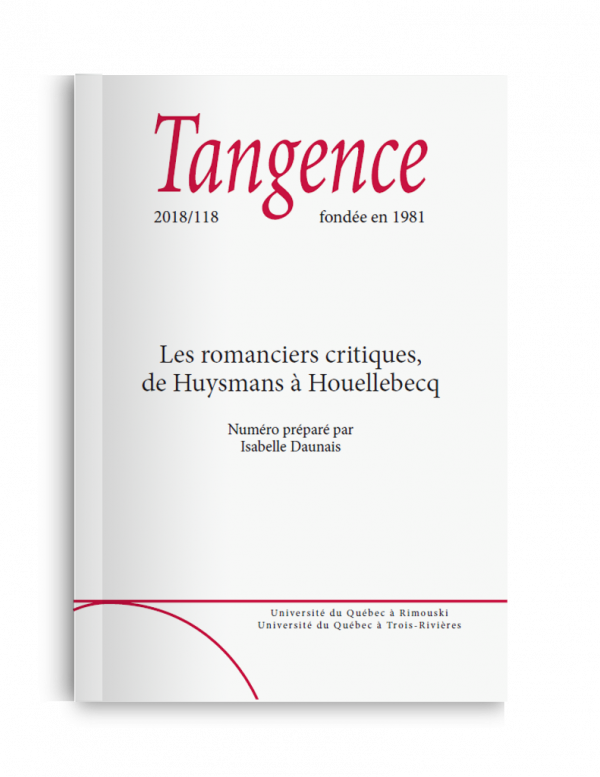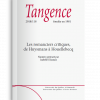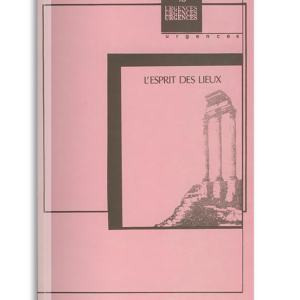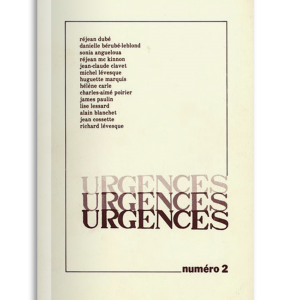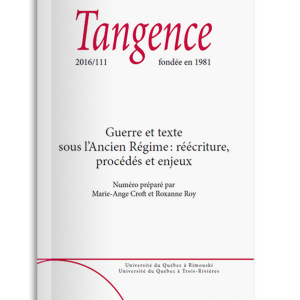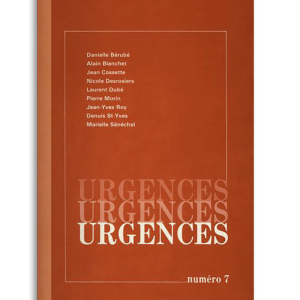Criticism and memory : novelists and the history of fiction
Isabelle Daunais
To what can we attribute the attachment of novelists—a good number of them in any case—to the history and memory of their art ? Why does it traverse and often motivate the vast body of their comments on fiction ? At the turn of the nineteenth and twentieth centuries, this attachment also referred to the novel’s success as the main literary genre (a success that called for selecting and tracing paths through a prodigious and ever-increasing output) and the reality that its memory today is more fragile than that of other genres and other arts. A genre without rules or a fixed model, fiction, to be recognized, insists that we recall what it has been—an effort that demands greater care and attention within a context of aesthetic renewal comparable to that of the twentieth century while it lasted. But another reason for novelists’ attachment to the history and memory of fiction is that it deals with the experience of duration and transformation. This means that its own narratives are always, in one way or another, narratives of time and change.
Changing the rules without changing the profession : the art of Huysmans’ fiction
Michel Biron
Huysmans proclaimed the “crisis of the novel” described by Michel Raimond, a rupture felt all the more strongly in that Huysmans had embraced the naturalist credo more enthusiastically than anyone else. But the author of En ménage and À rebours, the two novels examined in this article, disrupts without disrupting, as if he were seeking not so much to renew the genre as to demonstrate its arrival following the triumph of realism. This is Huysmans’ drama : he arrived afterwards. He may well have changed the rules of fiction, but the profession remained the same, albeit deprived of the momentum unique to those who had stamped triumphant realism on half a century. The battle was over. Each of Huysmans’ characters knows it and, to some extent, this resigned clear-sightedness is what gives them genuine presence, as Houellebecq noted in Soumission. Huysmans’ novelty thus seems paradoxical in that he is the first novelist of the post-novel period.
The French and European heritage of Italian fiction in the 1960s : a missed opportunity
Cecilia Benaglia
This article examines the importance of foreign fiction in Italian literature in order to explain why novelists associated with the Neoavanguardia focused on the work of their European, particularly French, contemporaries. The first part highlights one of the literary “events” of the 1960s : the arrival of the nouveau roman in Italy. The second part discusses the case of the writer Alberto Arbasino and his essay Certi romanzi, published in 1964. Arbasino’s critical approach to diverse literary models is understood in light of his generation’s historical situation and serves as a basis for exploring its relation to Europe’s fictional heritage.
The innocence of the novelist : Orhan Pamuk opens his art
Yan Hamel
This article focuses on The Naïve and the Sentimental Novelist, a written transposition of the lectures of Charles Eliot Norton given by Orhan Pamuk at Harvard University in 2009, and on Other Colours, a collection of essays that examines, in part, the art of fiction and the work of such major novelists as Sterne, Dostoevsky, Tolstoy, Mann, etc. The aim is to demonstrate how Pamuk’s thought on the art of fiction is deeply divided, put in tension by a series of unresolved contradictions. For example, the author, who seeks to present fiction as a self-sufficient genre —i.e., one capable of self-generation and self-conception—, is nonetheless revealed to be passionate about literary theory and eager to expose his ideas in non-fictional genres. This study proposes a reading that shows how the dynamic unique to fiction arises from precisely this instability and irresolution, which comes through in the meandering thinking developed by the winner of the Nobel Prize for literature.
“In any case, the formal issue is secondary” : Michel Houellebecq and the art of fiction
Olivier Parenteau
This article examines a vast body of texts written by Michel Houellebecq between 1991 and 2016 and expressing his views on the art of fiction. In his essay H.P. Lovecraft. Contre le monde, contre la vie, his two-volume collection of columns titled Interventions, his interviews, prefaces, pages of correspondence with Bernard-Henri Lévy, and the pages of his fiction (most notably his two most overtly metatextual novels : Extension du domaine de la lutte and La carte et le territoire), Houellebecq developed a discourse on fiction that has remained astonishingly stable over time. The novelist never missed an opportunity to recall his predilection for the so-called “traditional” forms of fiction—steadfastly insisting, not without a wish for controversy, that no real aesthetic revolution had occurred in this regard since Balzac. What’s more, Houellebecq attached a great deal of importance to the creation of realistic and psychologically complex characters without whom he could not have explored the phenomena of the real world to which his entire work was devoted.
“Fiction follows its own laws” or how novelists make the novel “the freest genre in existence”
Jolianne Gaudreault-Bourgeois
When they undertake to define the novel, novelists often mouth only one word : “freedom.” They do not hesitate to return to the word and repeat it because fiction, in their eyes, is clearly the free genre par excellence. This article focuses on the “obsessional” motif of freedom in a collection of essays on fiction written by novelists in the second half of the twentieth century : mainly Le roman en liberté (Félicien Marceau), Roman du roman (Jacques Laurent), L’invitation au mensonge (Gilles Barbedette) and Les testaments trahis (Milan Kundera). In these texts, fiction is not declared to be the “freest genre in existence” without personifying this literary genre, narrating its history and confronting it with various antagonists who try to domesticate it or subject it to rules. What are these rules ? Can fiction function without rules ? And, above all, is the freedom of fiction really a definitional issue ?

